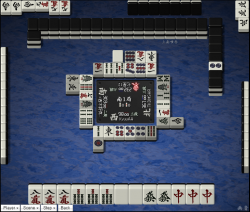Damaten: Difference between revisions
Jump to navigation
Jump to search
m (→Usage) |
mNo edit summary |
||
| Line 7: | Line 7: | ||
*When winning at all is the only thing that matters. When far in the lead, dama can be used to increase win rate (thus, ending the game faster). If the game is in [[oorasu|all last]], and winning with riichi wouldn't improve placement (even with ippatsu ron), dama can also be considered. | *When winning at all is the only thing that matters. When far in the lead, dama can be used to increase win rate (thus, ending the game faster). If the game is in [[oorasu|all last]], and winning with riichi wouldn't improve placement (even with ippatsu ron), dama can also be considered. | ||
*When the hand is valuable. Players will often [[defense|defend]] after a riichi declaration, so riichi will often lower your hand's winrate. Therefore, guaranteed [[haneman]] or higher hands should normally be dama - they already have enough value. In addition, every han past mangan has reduced value, further incentivizing dama. | *When the hand is valuable (haneman+). Players will often [[defense|defend]] after a riichi declaration, so riichi will often lower your hand's winrate. Therefore, guaranteed [[haneman]] or higher hands should normally be dama - they already have enough value. In addition, every han past mangan has reduced value, further incentivizing dama. | ||
**Guaranteed [[mangan]] ( | **Guaranteed [[mangan]] hands (counting 4 han 30 fu as mangan) can also consider dama: mangan with a bad wait, or mangan late in the game, should normally be dama. | ||
*When the hand is poor. If a hand would be riichi-only with a bad wait, committing to riichi may not be worthwhile. Staying dama gives a chance to tsumo and gives the option to [[fold]] if another player reaches tenpai. | *When the hand is poor. If a hand would be riichi-only with a bad wait, committing to riichi may not be worthwhile. Staying dama gives a chance to tsumo and gives the option to [[fold]] if another player reaches tenpai. | ||
*When the hand has many different ways improve. Riichi locks the hand in, preventing you from upgrading the wait or gaining yaku. If your hand has many upgrades, you may wish to dama. | *When the hand has many different ways improve. Riichi locks the hand in, preventing you from upgrading the wait or gaining yaku. If your hand has many upgrades, you may wish to dama. | ||
That being said, dama should not be overused. Riichi is a guaranteed +1 han, and on average provides +1.5 han. Since each han until mangan will roughly | That being said, dama should not be overused. Riichi is a guaranteed +1 han, and on average provides +1.5 han. Since each han until mangan will roughly double score, riichi offers a large score boost. See [[riichi strategy]] for more details on the decision to riichi or dama. | ||
==Game examples== | ==Game examples== | ||
Revision as of 19:49, 15 October 2024

Damaten 「黙聴」 ("hidden tenpai"), or dama for short, refers to a closed tenpai hand that has not called riichi. Typically, a dama hand will have a yaku without needing to riichi; otherwise, menzen tsumo (or another circumstantial yaku) would be needed to win. An older term yamiten 「闇聴」 refers to the same thing.
Usage
Main article: Riichi strategy
There are many reasons to dama. In most cases, it occurs when the extra points from riichi do not matter:
- When winning at all is the only thing that matters. When far in the lead, dama can be used to increase win rate (thus, ending the game faster). If the game is in all last, and winning with riichi wouldn't improve placement (even with ippatsu ron), dama can also be considered.
- When the hand is valuable (haneman+). Players will often defend after a riichi declaration, so riichi will often lower your hand's winrate. Therefore, guaranteed haneman or higher hands should normally be dama - they already have enough value. In addition, every han past mangan has reduced value, further incentivizing dama.
- Guaranteed mangan hands (counting 4 han 30 fu as mangan) can also consider dama: mangan with a bad wait, or mangan late in the game, should normally be dama.
- When the hand is poor. If a hand would be riichi-only with a bad wait, committing to riichi may not be worthwhile. Staying dama gives a chance to tsumo and gives the option to fold if another player reaches tenpai.
- When the hand has many different ways improve. Riichi locks the hand in, preventing you from upgrading the wait or gaining yaku. If your hand has many upgrades, you may wish to dama.
That being said, dama should not be overused. Riichi is a guaranteed +1 han, and on average provides +1.5 han. Since each han until mangan will roughly double score, riichi offers a large score boost. See riichi strategy for more details on the decision to riichi or dama.
Game examples
- Damaten in Japanese Wikipedia
- Multiple instances where damaten was employed.
| |||||||||||